Juniper Plant Benefits: How To Use Juniper For Herbal Use
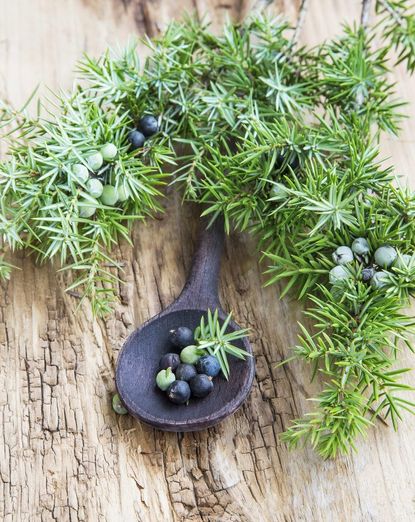

You may know juniper as the most widely distributed evergreen on the planet. But it’s a plant with secrets. Juniper plant benefits include both juniper herbal uses and also culinary. If you’d like more information about juniper shrubs as herb plants, read on.
Juniper as Herb Plants
Juniper plant benefits include their beauty in the garden. Juniper is a popular evergreen shrub that generally stays under 10 feet (3 m.) tall. It is native to Europe, Asia, and North America. The most common variety in this country is Juniperus communis. Juniper shrubs have needle-like leaves and grow seed cones. The outer scales of the cone are a deep blue merging on black. Gardeners refer to these as juniper berries. These berries are used in herbal medicine and give juniper the status of herb plants. The time it takes for juniper scales to mature varies depending on the sex of the tree. Scales from male juniper mature in 18 months while female juniper scales take 2 to 3 years to ripen. Many juniper herbal uses start with scales. Some herbalists argue that immature juniper scales are better medicinally, while others insist that mature scales are more potent.
How to Use Juniper for Herbal Use
How is juniper used herbally? Juniper extracts can be used medicinally or as culinary flavoring. As a medicine, it can be taken internally, inhaled, or applied topically. In Alaska, the Tanainas burn juniper needles on top of a hot wood stove to create an incense. This provides a wonderful smell, and also can aid with a cold. Many other juniper herbal uses start with extracts from the juniper berries/scales. The extracts contain terpinen-4-ol, a compound that stimulates the kidneys. They also contain amentoflavone, another compound with antiviral properties. If you want to burn juniper needles, you can strip some from your garden shrub and begin. It doesn’t take a lot to create a powerful smell. If you are wondering how to use juniper for herbal uses other than burning it, you can purchase juniper commercially in various forms. Look for capsules of oil, teas, and lotions. Some people ingest juniper, often in tea form. This is said to be helpful in treating bronchitis. It may also numb pain, fight inflammation, and increase production of stomach acid. It is also reputed to disinfect the urinary tract. Herbal practitioners suggest that drinking juniper tea helps to flush excess fluids from the body. This diuretic effect gets rid of the body’s excess uric acid. High in natural insulin, juniper may also reduce blood sugar levels. You can also apply essential oil of juniper topically. Rubbed on the skin, it may help with skin issues like acne or athlete's foot. Some use it to treat warts, skin growths, cystitis, psoriasis, and eczema. In addition to scale-berry oil, an oil can be made from juniper wood. It is called cade oil and is considered an important treatment of psoriasis on the scalp. Juniper oil has antibacterial properties, so it can be used to treat skin wounds and snakebites. Rubbing the oil into the skin may also help with joint and muscle pain. Disclaimer: The contents of this article is for educational and gardening purposes only. Before using ANY herb or plant for medicinal purposes, please consult a physician or a medical herbalist for advice.
Gardening tips, videos, info and more delivered right to your inbox!
Sign up for the Gardening Know How newsletter today and receive a free download of our most popular eBook "How to Grow Delicious Tomatoes."

Teo Spengler has been gardening for 30 years. She is a docent at the San Francisco Botanical Garden. Her passion is trees, 250 of which she has planted on her land in France.
-
 10 Best Apartment Plants To Turn Your Small Space Into An Oasis
10 Best Apartment Plants To Turn Your Small Space Into An OasisThe best apartment plants can lend an ambience of the tropics, brighten up a space, or add a touch of drama, and turn an apartment into a relaxing oasis.
By Amy Grant
-
 Grow a Bathroom Oasis: 8 Best Bathroom Plants With No Light or Low Light
Grow a Bathroom Oasis: 8 Best Bathroom Plants With No Light or Low LightSome apartment dwellers grow the best bathroom plants with no light or low light. Read how one of our favorite plant lovers does it in the big city.
By Teo Spengler
-
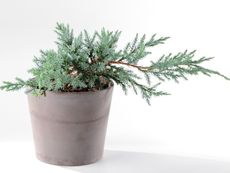 How To Grow A Potted Juniper: Caring For Juniper Trees In Containers
How To Grow A Potted Juniper: Caring For Juniper Trees In ContainersSmall juniper trees grow well in containers. Click here for information on how to care for potted junipers.
By Teo Spengler
-
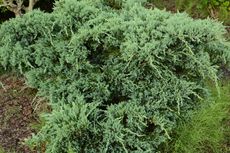 Japanese Juniper Care – How To Grow A Japanese Juniper Plant
Japanese Juniper Care – How To Grow A Japanese Juniper PlantIf you want a "set and forget" type of plant, Japanese juniper care is minimal and easy once established. For more information about this shrub of low heights and how to grow it in your garden, click the following article.
By Bonnie L. Grant
-
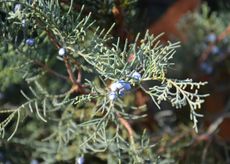 Mountain Cedar Information: Is Mountain Cedar Pollen Causing You Problems
Mountain Cedar Information: Is Mountain Cedar Pollen Causing You ProblemsMountain cedar is a tree with a common name full of contradictions. The tree is not a cedar at all, and its native range is central Texas, not known for its mountains. In fact, trees called mountain cedar are actually ashe juniper trees. Click here to learn more.
By Teo Spengler
-
 Are All Juniper Berries Edible – Is It Safe To Eat Juniper Berries
Are All Juniper Berries Edible – Is It Safe To Eat Juniper BerriesJuniper berries have been used as a strong flavoring for wine, mead, and other alcoholic beverages, as well as a spice for meats, stews, sauerkraut, and other dishes. Upon reading this, you may be wondering are all juniper berries edible? Click here for that answer.
By Darcy Larum
-
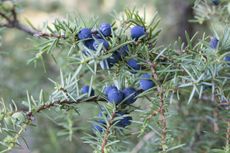 Juniper Berry Uses – What To Do With Juniper Berries
Juniper Berry Uses – What To Do With Juniper BerriesGiven that they are prolific and the fruit looks so much like a berry, the natural question is ‘can you eat juniper berries?” If so, what do you do with juniper berries? Click on the following article to find out how to use juniper berries along with some useful juniper berry recipes.
By Amy Grant
-
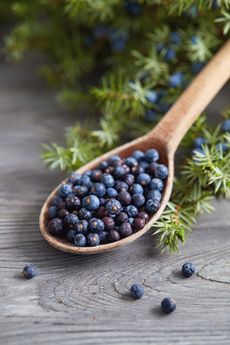 Juniper Berry Harvest Tips: How To Pick Juniper Berries
Juniper Berry Harvest Tips: How To Pick Juniper BerriesThere are about 40 species of juniper, most of which produce toxic berries. But for the educated eye, Juniperus communis, has edible, pleasantly pungent berries. Click this article for tips on how to pick juniper berries and how to recognize safe juniper plants.
By Bonnie L. Grant
-
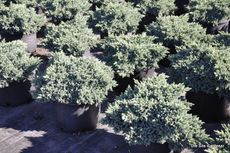 Growing Juniper ‘Blue Star’ – Learn About Blue Star Juniper Plants
Growing Juniper ‘Blue Star’ – Learn About Blue Star Juniper PlantsWith a name like "Blue Star," this juniper sounds as American as apple pie but, in fact, it is native to Afghanistan, the Himalayas, and western China. Gardeners love Blue Star for its thick, starry, blue-green foliage and its graceful rounded habit. Learn more here.
By Teo Spengler
-
 Can You Prune An Overgrown Juniper – Tips For Overgrown Juniper Pruning
Can You Prune An Overgrown Juniper – Tips For Overgrown Juniper PruningJuniper shrubs and trees are a great asset to landscaping. But sometimes, like the best things in life, they get away from us. What was once a smart shrub is now a wild, overgrown monster. So what can you do with a juniper that?s gotten out of hand? Find out here.
By Liz Baessler